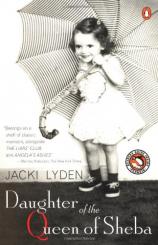Reading Group Guide
Discussion Questions
Daughter of the Queen of Sheba

1. Lyden says she was a diarist from the time she could write. How do you think writing helped her cope with her mother's illness? How may her mother's illness have contributed to Jacki's talent for writing?
2. Lyden writes "My life as her daughter, the life of my imagination, began with my mother's visions . . . Her madness was our narrative line. I am trying to decipher that line still, for its power and meaning over our past." What does this say about the way imagination and personality develop? How much are we the product of our parents' lives, and how much the product of our environment? Why do you think Dolores' illness prodded Jacki toward such dangerous assignments? How would it have contributed to Kate's unconventional lifestyle, and Sarah's craving for order in her own life?
3. Dolores didn't exhibit signs of mental illness until after her second marriage. How much of a role do you think her relationships with men, including her father, played in Dolores' illness?
4. Lyden often makes references to the pressures she felt protecting her mother, usually not the role of a daughter. How do you think this role reversal affected Jacki's adolescence? In what ways was Dolores a good mother to Jacki?
5. What do you think of Jacki's grandmother, Mabel? What were her strengths and weaknesses? How did she influence Jacki's life?
6. In the throes of her illness, Dolores is incredibly creative and energetic, and Lyden has preserved many of the notes and letters Dolores wrote to everyone from her lawyers to her daughters. Why do you think Lyden wants to hold on to these artifacts of her mother's illness? What do they tell her about who her mother really is?
7.As a child Jacki learned to tolerate not only her mother's erratic behavior, but her stepfather's cruel ways. Lyden writes, "the armed hands of children do not surprise me in the least. Children are fierce, without nuance or hesitation." What do you think allows children to withstand trauma; what makes them so resilient and fierce?
8. Lyden claims that she has been "drawn to men with despotic natures...A desperado helps one live dangerously, and perhaps that is how we know we are alive." Do you think Lyden's predilection for violent men had its roots in Dolores' relationship with the Doctor? If so, why wouldn't Jacki have learned the danger of being involved in those types of relationships instead of being attracted to them?
9. In the chapter, "Teotihuacán, Mexico, 1960," Lyden describes an incident in which she climbed an Aztec pyramid and tried to imagine what it would have been like to be a young girl about to be sacrificed at the altar. She strays so far into this daydream that she feels as if she had passed directly into ancient history—a sensation she likens to her mother's own periods of insanity. Why is this episode significant? What is Lyden saying about the delusions of the mentally ill as compared to the fierce imaginings of a young girl?
10. Lyden describes her and her sisters' childhood as "growing up like bumper cars in an arcade—the brakes applied harshly and erratically here, and no brakes or direction at all there... Growing up in Ping-Pong trajectories that no one else could follow, perversely desirable because our experience would protect us in dangerous situations." How different do you think her experience was from other girls her age? Was Jacki's childhood insecure or unconventional? What are the advantages and disadvantages of an unconventional upbringing?
Daughter of the Queen of Sheba
- Publication Date: October 1, 1998
- Paperback: 257 pages
- Publisher: Penguin (Non-Classics)
- ISBN-10: 014027684X
- ISBN-13: 9780733609022







